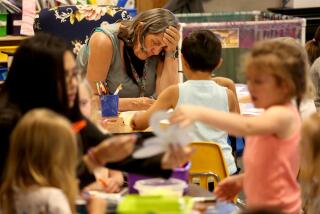Good Grades Are a Matter of Class
- Share via
I retired as a university lecturer (the American equivalent is assistant professor, I believe) in Australia just over five years ago, moved to L.A., rapidly became bored and saw an advertisement for teachers.
I became a “highly qualified” teacher after completing the work required for two levels of credentials and passing three tests to determine my basic grasp of the three Rs. Add to this 15 years of university teaching, three years of teaching upper-level high school to gifted students in Australia, two years of teaching in elementary and middle school in Maine many years ago, and seven years working in the mental health sector in the two countries.
With this humble experience, please allow me to offer a solution to the educational crisis facing us. This would be an alternative to creating small learning communities in overcrowded schools, offering merit pay to “good teachers,” increasing mentoring opportunities for supposedly bad teachers and the like.
Good teachers must work in the system (after all, children in La Canada Flintridge, San Marino and Manhattan Beach must have good teachers because their students get good grades on standardized tests), and bad teachers must work in the system (as evidenced by East Los Angeles, Watts and Compton, where students do rather poorly on standardized tests).
I propose running a bus for teachers between these neighborhoods -- leaving students in their schools, but moving the teachers. Supposedly good teachers would teach the students in Compton, Watts and East L.A., and bad teachers would teach the students from Manhattan Beach, San Marino and La Canada Flintridge.
To further enrich poor schools, perhaps we should also take teachers from the private school sector (say John Thomas Dye, the Curtis School and Campbell Hall) and send them to East L.A., etc.
After two years of this social experiment (cheap to run -- just the cost of several buses between schools), we should then see a dramatic increase in poor students’ grades and an equally dramatic decrease in well-to-do students’ grades.
However, I doubt that anyone would believe that such a transformation would occur.
Until we as a nation address the structural inequality undermining our society, we will not see a closing of the educational gap between the rich and the poor.
Until my students (in the poor sector) have access to private tutors; to quality medical, psychiatric and dental care; to adequate and nutritious food and to parents who can read and write and therefore understand the culture of schooling, we will not see much evidence of school equality, no matter what we do.
The inequality we face in education is the same inequality we face as a society, and to blame the teachers is to create a scapegoat that takes our mind off the larger problem facing us as a society.
I was a good teacher in Australia, good enough to teach the best and brightest in high school and in university, but here I must have become a poor teacher indeed because not one of my disabled students passed the state-mandated standardized tests last year.
My students also do not have health insurance, dental care or knowledgeable families. Some have severe hyperactivity that is untreated because their parents can’t afford the necessary drugs or are afraid they’ll lose their jobs if they take time off to take their children for doctor visits.
I have 16 students with mild to severe disabilities crammed into one classroom because there is no money and no place to house another classroom.
My school has an incredibly supportive principal; a good administrative team backing her up; good coaches; good and largely experienced teachers, most of whom are highly qualified under “No Child Left Behind;” and loving parents. But our culture does not support quality education because the money, knowledge and public support is not there to foster it.
I doubt I became a bad teacher by moving to my school, and I doubt I would be a better teacher if I taught at the Curtis School.
Maybe society should not be so quick to blame the teacher.
More to Read
Sign up for Essential California
The most important California stories and recommendations in your inbox every morning.
You may occasionally receive promotional content from the Los Angeles Times.













